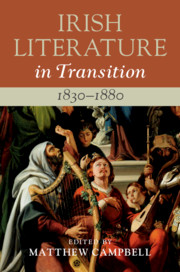Book contents
- Irish Literature in Transition, 1830–1880
- Irish Literature in Transition
- Irish Literature in Transition, 1830–1880
- Copyright page
- Contents
- Contributors
- Series Preface
- General Acknowledgements
- Acknowledgements
- Part I Contexts and Contents: Politics and Periodicals
- Part II Ireland and the Liberal Arts and Sciences
- Part III From the Four Nations to the Globalising Irish
- Chapter 8 England and Ireland, Tory and Whig: Thackeray, Trollope, Arnold
- Chapter 9 Imperial Minds: Irish Writers and Empire in the Nineteenth Century – Charles Gavan Duffy, Thomas Moore, Charles Lever and Kim
- Chapter 10 An Exiled History: Young Ireland from Mitchel to O’Leary
- Chapter 11 US Nation Building and the Irish-American Novel, 1830–1880
- Part IV The Languages of Literature
- Index
Chapter 8 - England and Ireland, Tory and Whig: Thackeray, Trollope, Arnold
from Part III - From the Four Nations to the Globalising Irish
Published online by Cambridge University Press: 29 February 2020
- Irish Literature in Transition, 1830–1880
- Irish Literature in Transition
- Irish Literature in Transition, 1830–1880
- Copyright page
- Contents
- Contributors
- Series Preface
- General Acknowledgements
- Acknowledgements
- Part I Contexts and Contents: Politics and Periodicals
- Part II Ireland and the Liberal Arts and Sciences
- Part III From the Four Nations to the Globalising Irish
- Chapter 8 England and Ireland, Tory and Whig: Thackeray, Trollope, Arnold
- Chapter 9 Imperial Minds: Irish Writers and Empire in the Nineteenth Century – Charles Gavan Duffy, Thomas Moore, Charles Lever and Kim
- Chapter 10 An Exiled History: Young Ireland from Mitchel to O’Leary
- Chapter 11 US Nation Building and the Irish-American Novel, 1830–1880
- Part IV The Languages of Literature
- Index
Summary
This chapter explores how three major nineteenth-century English literary figures lived, perceived and wrote about the troubled relationship between England and Ireland. Describing their collective belief in the Union, the chapter seeks to place the writers politically in terms of their ideas about Ireland as expressed in their fiction, their journalism and their private correspondence. They are shown to have flirted with the liberal agenda for Ireland but essentially, following Edmund Burke, can be seen to have adopted increasingly conservative (and anti-Gladstonian) positions - favouring coercion before concession - as they grew older and as the spectre of Home Rule became more real in the closing decades of the century.
- Type
- Chapter
- Information
- Irish Literature in Transition, 1830–1880 , pp. 127 - 142Publisher: Cambridge University PressPrint publication year: 2020

